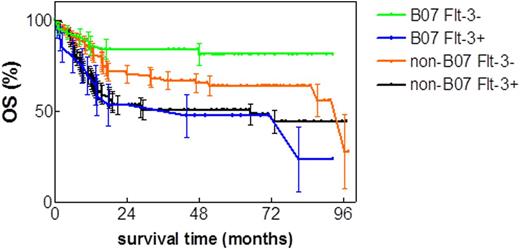Abstract
Background
We have recently identified a skewed distribution of class I human leukocyte antigens (HLA) among patients with AML and mutated nucleophosmin gene (NPMc+ AML). A lower frequency of several HLA allelic groups in the NPMc+ AML patient cohort was in good correlation with the results of theoretical predictions for high-affinity immunopeptides derived from NPM1, suggesting that an anti-NPM1 immune response could prevent leukemia development in patients with a suitable HLA class I type.
Aim
We here present more detailed analysis of HLA-specific features, in a much larger cohort (N = 357) of AML patients with NPM1 mutation (type A/D) from several centers in the Czech Republic, Germany and Poland.
Results
Most importantly, we confirmed the lower incidence of B´40 and C´07 allelic groups in NPMc+ AML compared to the normal values. The moderate decrease of A´02 allelic group frequency became statistically significant in this larger patient cohort (see Table). On the other hand, no difference in HLA class II frequencies was found compared to the normal distribution.
Furthemore, patients with B´07 allelic group had a significantly better prognosis, but only in the absence of Flt-3-ITD mutations (p = 0.049, see Figure). HLA typing was performed by molecular methods in a subgroup of patients (N = 73), allowing for discrimination between C´07 alleles. In this subgroup, C*07:01, but not C*07:02/04 expression was associated with better overall survival (p = 0.036), in agreement with theoretical predictions.
Conclusion
Our results support the hypothesis that anti-NPM1 immune response reduces AML development and contributes to a better outcome of NPMc+ AML patients with suitable HLA class I type (including at least A´02, B´07, B´40 and C*07:01). Furthermore, NPMc+ immunogenicity is caused rather by its aberrant localization than by the generation of a unique aminoacid sequence.
Schetelig:Sanofi: Honoraria. Thiede:AgenDix: Employment, Other: Ownership.
Author notes
Asterisk with author names denotes non-ASH members.



This feature is available to Subscribers Only
Sign In or Create an Account Close Modal